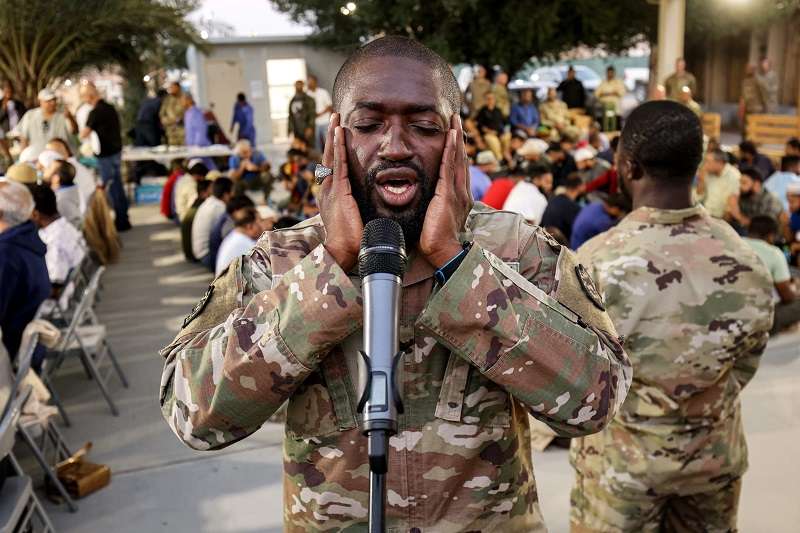Camp Arifjan, the US Army installation in Kuwait held a special Iftar, (breaking the fast) event for Kuwaiti media representatives, with hundreds of soldiers and camp employees in attendance. The occasion highlighted the beauty of religious tolerance and harmony between what are known as ‘heavenly religions’.
Following a religious sermon by a preacher from the Ministry of Awqaf and Islamic Affairs, and minutes before the call to prayer, a large number of soldiers, workers, and others performed ablution in preparation for the Maghrib prayer. They then ate a few dates and entered the mosque to pray Maghrib, only after which they began eating the Iftar meal. One soldier relayed the ‘wonderful feeling’ he experienced when he witnessed the Muslims in their prayers. He talked about how it makes him feel comfortable, safe, and peaceful.
Colonel Martin Wolgemut, the area support commander and the general supervisor of operations at Camp Buehring and Arifjan said there were around 100 Muslim American soldiers among the ranks of the American forces stationed in Camp Arifjan. He pointed out that the US Army was keen to host preachers from the Kuwaiti Ministry of Awqaf and Islamic Affairs during the month of Ramadan to present sermons and share iftar with Muslim soldiers. He added that several Muslim civilians also work at the camp and mentioned that a new prayer tent was added this year to enable the Muslims, whether military or civilian, to perform their five daily prayers.
Regarding the change witnessed in the US army and possibility of shedding Islamophobia, Col. Wolgemut stressed, “Yes, there is change and there has been cooperation with preachers from Kuwait to introduce soldiers to the teachings of Islam.”
Meanwhile, the English preacher at the Ministry of Awqaf and Islamic Affairs, Muhammad al-Naqwi, mentioned that he visited the Arifjan camp many times, by coordinating with the Ministries of Endowments and Defense, to deliver speeches and lectures that would benefit Muslims and non-Muslims.
In a statement to reporters before the Iftar ceremony, he pointed out that these visits always benefit the Muslims as well as the American soldiers who work in Camp Arifjan. “Some visits were interspersed with questions and answers from many non-Muslims and soldiers in the US army.” He said that their questions were useful, “especially since they have things they do not understand or something they do not know about, and the answers are based on reality from the Qur’an and Sunnah, and then they get acquainted with the basics of the Islamic religion.”
For his part, Benjamin Heinz, the chaplain of Camp Arifjan said, “We are working closely together to promote interfaith dialogue in our camp. We have Muslims, Christians, and Jews among our forces.” He mentioned that the Muslim prayer tent holds the five daily prayers and Friday prayers, and every Friday, more than 25 soldiers participate in performing prayers. He also noted that the celebration of Ramadan this year coincided with the celebrations of other religious holidays such as the Christian Easter Sunday, the day of Resurrection.
He praised the freedom of belief within the US army, stating that the mission of all leaders is to provide religious freedom for every person. He added that Ramadan was an occasion to spread the teachings of the Islamic religion, educate soldiers about the rituals of their religion, and learn about the month of Ramadan.
Shaul Daniel, a Jewish rabbi from the US Army also attended the breakfast banquet in the camp to advise and guide the camp’s Jewish soldiers. He praised the coexistence between all religions in the camp, pointing out that there are about 30 Jewish soldiers in the Buehring and Arifjan camps.
He added, “I studied various religions, and found similarities between the Islamic and the Jewish religions, for instance, when it comes to halal eating, marriage, death, and washing the dead. We have one father, the Prophet Abraham, and I invite everyone to love each other,” he said, while noting that Kuwait is known for its religious tolerance and accepts all religions.

